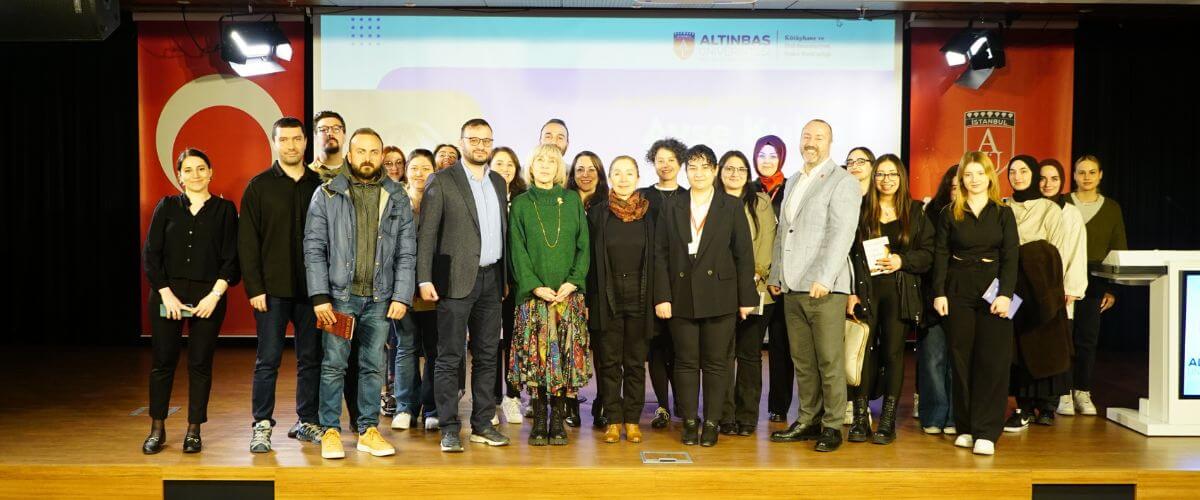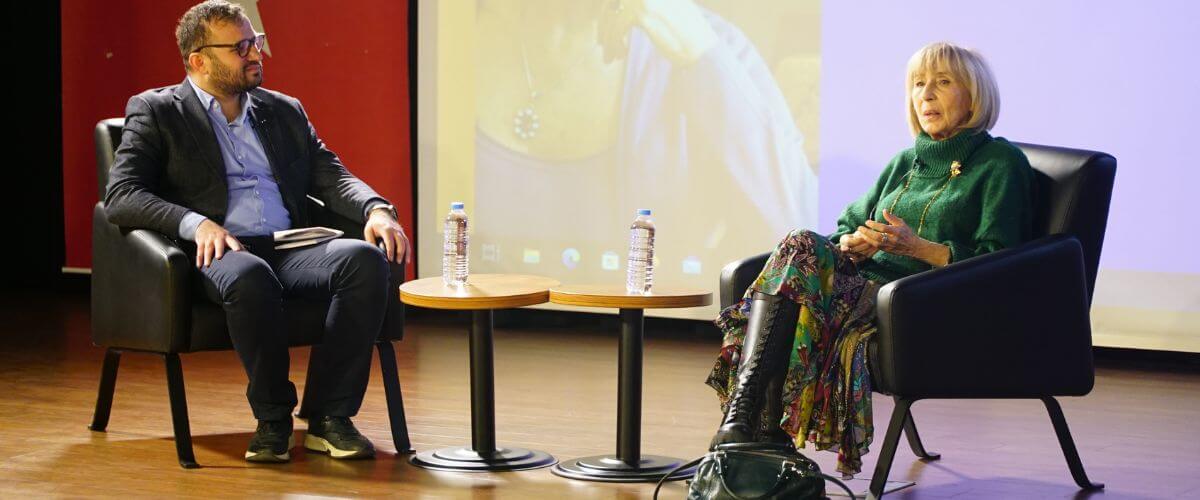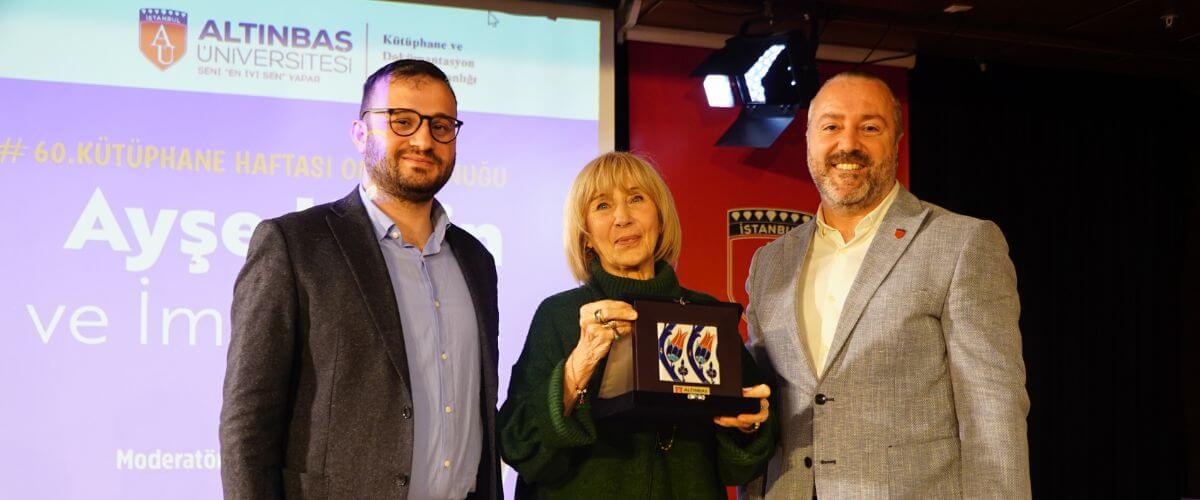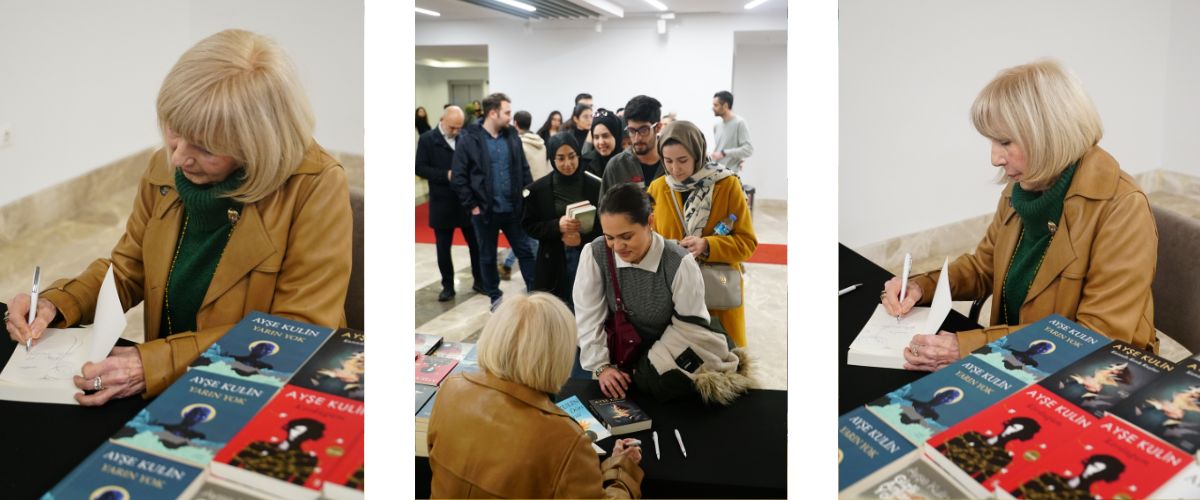Ayşe Kulin Interview at Altınbaş University
Within the 60th Library Week, an interview and signing day was organized at Altınbaş University with the participation of Ayşe Kulin. In the interview, Kulin advised young people
According to the data from the Turkish Statistical Institute (TÜİK) in 2023, it is observed that 69% of individuals aged 15 and over did not read any books in the last 12 months, while 31% read at least one book. When looking at the book reading rates by age groups, the age group that read the most books other than textbooks in the last 12 months is the 15-24 age group with 50.9%.
Approaching the development of reading habits sensitively, Altınbaş University hosted Author Ayşe Kulin as part of the 60th Library Week events. In the discussion organized by the Library and Documentation Directorate, Ayşe Kulin met with many students and academics, then signed books and took photos with her fans.
In the discussion moderated by Author Melih Yılmaz, addressing the youth, Ayşe Kulin said, "You could be the last generation that reads books. A different generation is growing up. Of course, life's conditions are changing. The influence of social media cannot be denied. But books are tools that open different windows of life for us. You can touch lives you wouldn't know about otherwise. Whether it's printed books or digital screens, make sure to read books."
As a married mother of four children, Ayşe Kulin mentioned how she couldn't publish her books for 25 years due to prejudices, and she explained that becoming a better person and overcoming prejudices is best achieved through books. She described how she was influenced by the book "Varoşta Kadın Olmak" by Nalan Türkeli, a primary school dropout author she met on a television program when she started writing: "Before reading the book, I used to feel resentful towards those who rummaged through garbage for littering the environment. However, when I read about how a leftover piece of cake brought joy to those households, my prejudices changed with tears in my eyes. That book opened a window to a life I didn't know."
According to Ayşe Kulin, books can help us become better people. Especially recommending young people to read books, Kulin said, "A book enters your homes. You get to know and understand all kinds of people. You have topics to discuss in your pockets. You'll have topics to talk about on your first date with your lover. You'll do everything, including making love, better."
Ayşe Kulin, whose grandfather was the last finance minister of the Ottoman Empire, and whose father grew up during the years when the Republic gave the utmost importance to education, talked about carrying traces of both cultures. She recounted how her grandfather initially felt resentful towards Atatürk due to the alphabet reform, but understood Atatürk's correctness on the matter only three months after she started school and wrote and sent her first letter to her grandparents, saying, "If you had learned to write with the old alphabet, you wouldn't have been able to write me a letter in three months. Learning to write a script without vocal letters would have taken years. Atatürk was right about this too."
Emphasizing the significant role of her education in becoming a writer, Ayşe Kulin, while studying at Robert College, mentioned that she was classmates with renowned authors such as Tomris Uyar, Pınar Kür, İpek Ongun, and Nazlı Eray, saying, "This is not a coincidence; we had an educational environment that valued art and respected everyone. We were raised well."
Stressing that everyone has a talent in life, Kulin said, "It could be tailoring, painting, music. Find this talent that is passed down in your genes. Believe in this ability. Then you will do it better. Mine was writing."
Answering questions about how university students write their books, Kulin said she believes that authors should create awareness about societal issues and described her experiences and approaches in writing her books with the following words: "If I'm writing a book based on historical facts like 'Everywhere There Is Blood,' I do extensive research. You can see the consequences of the Ottoman Empire, which lasted 600 years, not being able to update itself. For example, 'Sevdalinka' and 'Kardelenler' were books that changed my views. When I went to Bosnia for 'Sevdalinka,' my admiration for the West changed. Not as a system, but I saw they were not good for humanity. While writing 'Kardelenler,' I got to know Türkan Saylan. I understood the importance of girls' education in Anatolia once again. Our girls should be able to act according to their own will. I was taken aback when Leyla Zana was taken out of the Parliament in handcuffs during her time as a member of parliament. She's not a runaway woman. I wanted to learn what she felt. But I couldn't meet her. I wanted to research why we are so reactionary. History is a thing of the past. One day, while writing my book, I tackled the solutions to the problem by looking ahead. In my book 'Yarın Yok,' I talk about the need to do our best to avoid war. For this, women have more work to do due to their nurturing nature. Let's get our act together before we lose the world."





